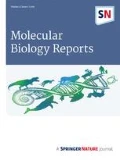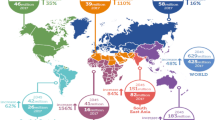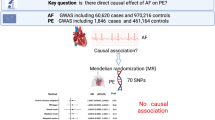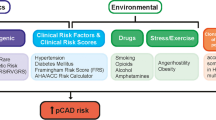Abstract
Monocyte differentiation antigen CD14 is considered an important cell-activating mediator of inflammatory responses that may result in atherosclerosis, coronary heart disease (CHD), thrombus formation, and myocardial infarction (MI). A common C-260T polymorphism in the promoter of the CD14 gene, the trans-membrane receptor of lipopolysaccharides, has been inconsistently associated with CHD. To investigate this inconsistency, we performed a meta-analysis of 28 studies involving a total of 13,335 CHD cases and 7,979 controls for C-260T of the CD14 gene to evaluate the effect of CD14 on genetic susceptibility for CHD. An overall random effects odds ratio of 1.24 (95 % CI: 1.12–1.36, P < 10−5) was found for T allele. Significant results were also observed using dominant (OR = 1.34, 95 % CI: 1.17–1.54, P < 10−4) or recessive genetic model (OR = 1.25, 95 % CI: 1.10–1.41, P = 0.0004). There was strong evidence of heterogeneity (P < 10−5), which largely disappeared after stratification by ethnicity. After stratified by ethnicity, significant results were found in East Asians; whereas no significant associations were found among Caucasians and other ethnic populations in all genetic models. In the stratified analysis according to sample size, CHD endpoints, and HWE status, significantly increased risks for the polymorphism were found in all genetic models. In conclusion, our results indicate that the CD14 C-260T polymorphism is a risk factor of CHD, especially in East Asians. However, additional very large-scale studies are warranted to confirm our results.



Similar content being viewed by others
References
Wright SD, Ramos RA, Tobias PS, Ulevitch RJ, Mathison JC (1990) CD14, a receptor for complexes of lipopolysaccharide (LPS) and LPS-binding protein. Science 249:1431–1433
Schumann RR, Rietschel ET, Loppnow H (1994) The role of CD14 and lipopolysaccharide-binding protein (LBP) in the activation of different cell types by endotoxin. Med Microbiol Immunol 183:279–297
Kane JP, Havel RJ (1999) Polymorphism of the lipopolysaccharide receptor (CD14) and myocardial infarction: new evidence for a role of Gram-negative bacterial infection? Circulation 99:3210–3212
Cleveland MG, Gorham JD, Murphy TL, Tuomanen E, Murphy KM (1996) Lipoteichoic acid preparations of gram-positive bacteria induce interleukin-12 through a CD14-dependent pathway. Infect Immun 64:1906–1912
Gupta D, Kirkland TN, Viriyakosol S, Dziarski R (1996) CD14 is a cell-activating receptor for bacterial peptidoglycan. J Biol Chem 271:23310–23316
Baldini M, Lohman IC, Halonen M et al (1999) A Polymorphism* in the 5′ flanking region of the CD14 gene is associated with circulating soluble CD14 levels and with total serum immunoglobulin E. Am J Respir Cell Mol Biol 20:976–983
Stroup DF, Berlin JA, Morton SC et al (2000) Meta-analysis of observational studies in epidemiology: a proposal for reporting. JAMA 283:2008–2012
Cochran WG (1954) The combination of estimates from different experiments. Biometrics 10:101–129
Thompson SG, Sharp SJ (1999) Explaining heterogeneity in meta-analysis: a comparison of methods. Stat Med 18:2693–2708
Egger M, Davey Smith G, Schneider M, Minder C (1997) Bias in meta-analysis detected by a simple, graphical test. BMJ 315:629–634
Unkelbach K, Gardemann A, Kostrzewa M, Philipp M, Tillmanns H, Haberbosch W (1999) A new promoter polymorphism in the gene of lipopolysaccharide receptor CD14 is associated with expired myocardial infarction in patients with low atherosclerotic risk profile. Arterioscler Thromb Vasc Biol 19:932–938
Hubacek JA, Rothe G, Pit’ha J, Skodová Z, Stanĕk V, Poledne R, Schmitz G (1999) C(-260)– >T polymorphism in the promoter of the CD14 monocyte receptor gene as a risk factor for myocardial infarction. Circulation 99:3218–3220
Shimada K, Watanabe Y, Mokuno H, Iwama Y, Daida H, Yamaguchi H (2000) Common polymorphism in the promoter of the CD14 monocyte receptor gene is associated with acute myocardial infarction in Japanese men. Am J Cardiol 86:682–684
Zee RY, Lindpaintner K, Struk B, Hennekens CH, Ridker PM (2001) A prospective evaluation o4f the CD14 C(-260)T gene polymorphism and the risk of myocardial infarction. Atherosclerosis 154:699–702
Nauck M, Winkelmann BR, Hoffmann MM, Bohm BO, Wieland H, Marz W (2002) C(-260)T polymorphism in the promoter of the CD14 gene is not associated with coronary artery disease and myocardial infarction in the Ludwigshafen Risk and Cardiovascular Health (LURIC) study. J Am Coll Cardiol 90:1249–1252
Koch W, Kastrati A, Mehilli J, von Beckerath N, Schomig A (2002) CD14 gene-159C/T polymorphism is not associated with coronary artery disease and myocardial infarction. Am Heart J 143:971–976
Koenig W, Khuseyinova N, Hoffmann MM et al (2002) CD14 C(-260)3T polymorphism, plasma levels of the soluble endotoxin receptor CD14, their association with chronic infections and risk of stable coronary artery disease. J Am Coll Cardiol 40:34–42
Pan M, Gu WD, Chen F et al (2003) C(-260)T polymorphism in CD14 gene promoter and its association with coronary heart disease in Chinese population. Zhongguo Wu Zhen Xue Za Zhi 3:1458–1459 (In Chinese)
Hohda S, Kimura A, Sasaoka T et al (2003) Association study of CD14 polymorphism with myocardial infarction in a Japanese population. Jpn Heart J 44:613–622
Longobardo MT, Cefalu AB, Pezzino F et al (2003) The C(-260)3T gene polymorphism in the promoter of the CD14 monocyte receptor gene is not associated with acute myocardial infarction. Clin Exp Med 3:161–165
Morange PE, Tiret L, Saut N et al (2004) TLR4/Asp299Gly, CD14/C-260T, plasma levels of the soluble receptor CD14 and the risk of coronary heart disease: the PRIME Study. Eur J Hum Genet 12:1041–1049
Arroyo-Espliguero R, El-Sharnouby K, Vazquez-Rey E, Kalidas K, Jeffery S, Kaski JC (2005) CD14 C(-260)T promoter polymorphism and prevalence of acute coronary syndromes. Int J Cardiol 98:307–312
Morange PE, Saut N, Alessi MC et al (2005) Interaction between the C-260T polymorphism of the CD14 gene and the plasma IL-6 concentration on the risk of myocardial infarction: the HIFMECH study. Atherosclerosis 179:317–323
Li Y, Xiong XQ, Zhang PA, Ming KH (2005) Association of C-159T polymorphism in promoter region of CD14 and coronary heart disease. Zhonghua Yi Xue Yi Chuan Xue Za Zhi 22:687–690 (In Chinese)
Hu R, Cheng LX, He MA, Wu TC (2006) Polymorphism in the promoter of the CD14 monocyte receptor gene is a risk factor for coronary heart disease in Wuhan population. Zhongguo Lao Nian Xin Xue Guan Bing Za Zhi 8:184–186 (In Chinese)
Chen F (2006) Distributionof-159C/T gene polymorphism in promoter Region of CD14 and its significance for plasma lipids levels. Shi Yong Yu Fang Yi Xue 13:844–847 (In Chinese)
Wei YS, Liu YG, Tang RG, Lan JS (2006) Association between CD14 gene promoter region polymorphisms and coronary heart disease. Di Si Jun Yi Da Xue Xue Bao 27:630–633 (In Chinese)
Li L, Zhang K, Qiu F et al (2007) Association of C (-159)T polymorphism in the promoter of CD14 gene with coronary heart disease in Han population of Jiangsu province. Zhongguo Zu Zhi Gong Cheng Yan Jiu Yu Lin Chuang Kang Fu 11:8749–8752 (In Chinese)
Giacconi R, Caruso C, Lio D et al (2007) CD14 C (-260)T polymorphism, atherosclerosis, elderly: role of cytokines and metallothioneins. Int J Cardiol 120:45–51
Lorenzova A, Stanek V, Gebauerova M et al (2007) High-sensitivity C-reactive protein concentration in patients with myocardial infarction-environmental factors, and polymorphisms in interleukin-10 and CD14 genes. Clin Chem Lab Med 45:855–861
Cai NG, Cheng JJ, Luo Q et al (2007) Study of the relationship between CD14 gene promoter C(-260)T point mutation and plasma IL-6 and coronary artery disease in northern Chinese Han population. Zhongguo Lao Nian Xue Za Zhi 27:2300–2302 (In Chinese)
Xie YX, Bu-Ai JE, Ma YT, Ma X, Fu ZY, Jia ZH (2008) Distribution of -260C/T single nucleotide polymorphisms (SNP) in the promoter region of CD 14 gene and its significance for coronary heart disease and plasma lipids levels between the Han and the Uyghur people in Xinjiang. Zhongguo Xin Xue Guan Bing Yan Jiu 6:403–406 (In Chinese)
Haberbosch W, Unkelbach K, Schuster D, Gardemann A, Tillmanns H, Hölschermann H (2009) CD14 promoter polymorphism (- 159C– > t) is not associated with myocardial infarction or coronary artery disease in patients with assumed high genetic risk. Thorac Cardiovasc Surg 57:386–390
Banerjee I, Pandey U, Hasan OM, Parihar R, Tripathi V, Ganesh S (2009) Association between inflammatory gene polymorphisms and coronary artery disease in an Indian population. J Thromb Thrombolysis 27:88–94
Liu XQ, Yang JY (2010) The association between C-159T polymorphism in promoter region of CD l4 polymorphism and coronary heart disease. Yi Xue Xin Zhi Za Zhi 20:427–429 (In Chinese)
Rizzello V, Liuzzo G, Trabetti E et al (2010) Role of the CD14 C(S260)T promoter polymorphism in determining the first clinical manifestation of coronary artery disease. J Cardiovasc Med (Hagerstown) 11:20–25
Liu ZR, Liu GY, Wei YS, Pan XS, Huang ZH, Meng LQ (2010) Serum CD l4 levels and the genotypes of CD l4 gene in patients with acute myocardial infarction. Zhongguo Lao Nian Xue Za Zhi 30:743–745 (In Chinese)
Sediri Y, Hammami S, Kallel A et al (2011) C(-260)T polymorphism in the promoter of CD 14 gene is not associated with myocardial infarction in the Tunisian population. Exp Mol Pathol 90:276–279
LeVan TD, Bloom JW, Bailey TJ et al (2001) A common single nucleotide polymorphism in the CD14 promoter decreases the affinity of Sp protein binding and enhances transcriptional activity. J Immunol 167:5838–5844
Ziegler-Heitbrock HW, Ulevitch RJ (1993) CD14: cell surface receptor and differentiation marker. Immunol Today 14:121–125
Author information
Authors and Affiliations
Corresponding author
Rights and permissions
About this article
Cite this article
Pu, H., Yin, J., Wu, Y. et al. The association between CD14 gene C-260T polymorphism and coronary heart disease risk: a meta-analysis. Mol Biol Rep 40, 4001–4008 (2013). https://doi.org/10.1007/s11033-012-2478-y
Received:
Accepted:
Published:
Issue Date:
DOI: https://doi.org/10.1007/s11033-012-2478-y




